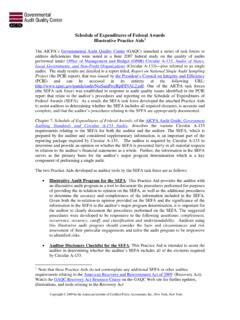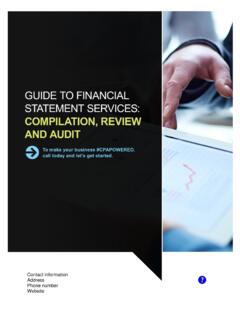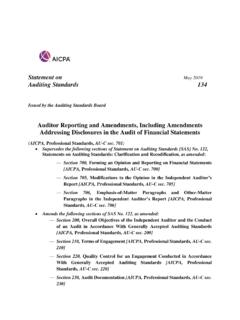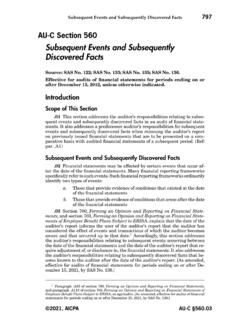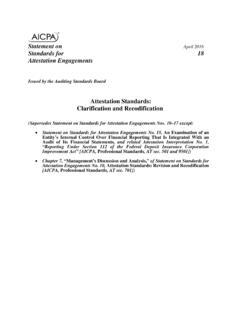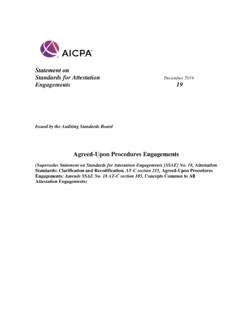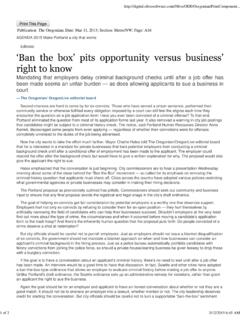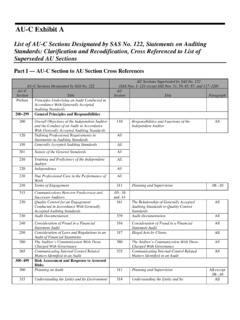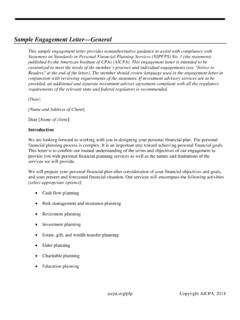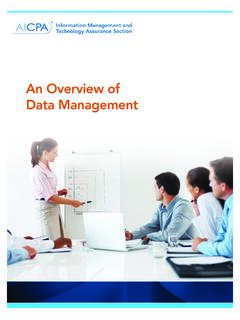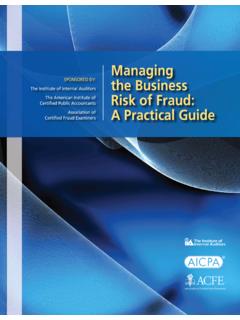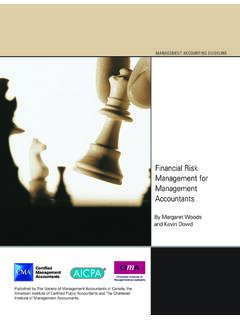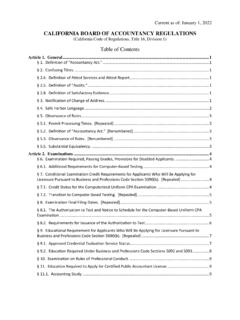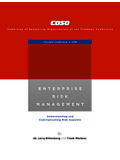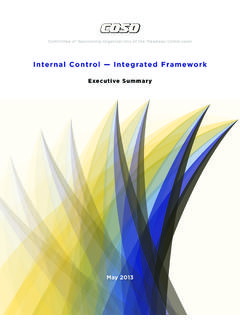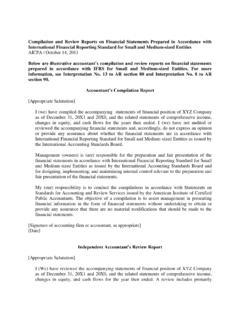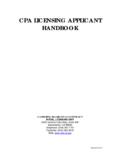Transcription of Code of Conduct - American Institute of Certified Public ...
1 Code of Professional Conduct As of December 14, 2014 As of December 15, 2014, this version of the AICPA Code of Professional Conduct will be superseded by a new version. The feature-enhanced new version of the AICPA Code of Professional Conduct that is effective as of December 15, 2014, is accessible at Page 1 Code of Professional Conduct INTRODUCTION As Adopted January 12, 1988, unless otherwise indicated. Composition, Applicability, and Compliance The Code of Professional Conduct of the American Institute of Certified Public accountants consists of two sections (1) the Principles and (2) the Rules. The Principles provide the framework for the Rules, which govern the performance of professional services by members. The Council of the Ameri-can Institute of Certified Public accountants is authorized to designate bodies to promulgate technical standards under the Rules, and the bylaws require adherence to those Rules and standards.
2 The Code of Professional Conduct was adopted by the membership to provide guidance and rules to all members those in Public practice, in industry, in government, and in education in the performance of their professional responsibilities. Compliance with the Code of Professional Conduct , as with all standards in an open society, de-pends primarily on members' understanding and voluntary actions, secondarily on reinforcement by peers and Public opinion, and ultimately on disciplinary proceedings, when necessary, against members who fail to comply with the Rules. Other Guidance Interpretations of Rules of Conduct consist of interpretations which have been adopted, after expo-sure to state societies, state boards, practice units and other interested parties, by the professional ethics division's executive committee to provide guidelines as to the scope and application of the Rules but are not intended to limit such scope or application.
3 A member who departs from such guidelines shall have the burden of justifying such departure in any disciplinary hearing. Interpretations which existed before the adoption of the Code of Professional Conduct on January 12, 1988, will remain in effect until further action is deemed necessary by the appropriate senior technical committee. Ethics Rulings consist of formal rulings made by the professional ethics division's executive commit-tee after exposure to state societies, state boards, practice units and other interested parties. These rulings summarize the application of Rules of Conduct and Interpretations to a particular set of factual circum-stances. Members who depart from such rulings in similar circumstances will be requested to justify such departures. Ethics Rulings which existed before the adoption of the Code of Professional Conduct on January 12, 1988, will remain in effect until further action is deemed necessary by the appropriate senior technical committee.
4 Publication of an Interpretation or Ethics Ruling in The Journal of Accountancy constitutes notice to members. Hence, the effective date of the pronouncement is the last day of the month in which the pro-nouncement is published in The Journal of Accountancy. The professional ethics division will take into consideration the time that would have been reasonable for the member to comply with the pronounce-ment. A member should also consult, if applicable, the ethical standards of his or her state CPA society, state board of accountancy, the Securities and Exchange Commission, and any other governmental Page 2 agency, which may regulate his or her client's business or use his or her report to evaluate the client's compliance with applicable laws and related regulations. Page 3 ET Section 50 PRINCIPLES OF PROFESSIONAL Conduct Page 4 ET Section 51 Preamble .01 Membership in the American Institute of Certified Public accountants is voluntary.
5 By accepting mem-bership, a Certified Public accountant assumes an obligation of self-discipline above and beyond the re-quirements of laws and regulations..02 These Principles of the Code of Professional Conduct of the American Institute of Certified Public Ac-countants express the profession's recognition of its responsibilities to the Public , to clients, and to col-leagues. They guide members in the performance of their professional responsibilities and express the basic tenets of ethical and professional Conduct . The Principles call for an unswerving commitment to honorable behavior, even at the sacrifice of personal advantage. Page 5 ET Section 52 Article I Responsibilities In carrying out their responsibilities as professionals, members should exercise sensitive professional and moral judgments in all their activities..01 As professionals, Certified Public accountants perform an essential role in society.
6 Consistent with that role, members of the American Institute of Certified Public accountants have responsibilities to all those who use their professional services. Members also have a continuing responsibility to cooperate with each other to improve the art of accounting, maintain the Public 's confidence, and carry out the pro-fession's special responsibilities for self-governance. The collective efforts of all members are required to maintain and enhance the traditions of the profession. Page 6 ET Section 53 Article II The Public Interest Members should accept the obligation to act in a way that will serve the Public interest, honor the Public trust, and demonstrate commitment to professionalism..01 A distinguishing mark of a profession is acceptance of its responsibility to the Public . The accounting profession's Public consists of clients, credit grantors, governments, employers, investors, the business and financial community, and others who rely on the objectivity and integrity of Certified Public ac-countants to maintain the orderly functioning of commerce.
7 This reliance imposes a Public interest re-sponsibility on Certified Public accountants . The Public interest is defined as the collective well-being of the community of people and institutions the profession serves..02 In discharging their professional responsibilities, members may encounter conflicting pressures from among each of those groups. In resolving those conflicts, members should act with integrity, guided by the precept that when members fulfill their responsibility to the Public , clients' and employers' interests are best served..03 Those who rely on Certified Public accountants expect them to discharge their responsibilities with integ-rity, objectivity, due professional care, and a genuine interest in serving the Public . They are expected to provide quality services, enter into fee arrangements, and offer a range of services all in a manner that demonstrates a level of professionalism consistent with these Principles of the Code of Professional Conduct .
8 04 All who accept membership in the American Institute of Certified Public accountants commit them-selves to honor the Public trust. In return for the faith that the Public reposes in them, members should seek continually to demonstrate their dedication to professional excellence. Page 7 ET Section 54 Article III Integrity To maintain and broaden Public confidence, members should perform all professional responsibilities with the highest sense of integrity..01 Integrity is an element of character fundamental to professional recognition. It is the quality from which the Public trust derives and the benchmark against which a member must ultimately test all decisions..02 Integrity requires a member to be, among other things, honest and candid within the constraints of client confidentiality. Service and the Public trust should not be subordinated to personal gain and advantage. Integrity can accommodate the inadvertent error and the honest difference of opinion; it cannot accom-modate deceit or subordination of principle.
9 03 Integrity is measured in terms of what is right and just. In the absence of specific rules, standards, or guidance, or in the face of conflicting opinions, a member should test decisions and deeds by asking: "Am I doing what a person of integrity would do? Have I retained my integrity?" Integrity requires a member to observe both the form and the spirit of technical and ethical standards; circumvention of those standards constitutes subordination of judgment..04 Integrity also requires a member to observe the principles of objectivity and independence and of due care. Page 8 ET Section 55 Article IV Objectivity and Independence A member should maintain objectivity and be free of conflicts of interest in discharging professional responsibilities. A member in Public practice should be independent in fact and appearance when providing auditing and other attestation services..01 Objectivity is a state of mind, a quality that lends value to a member's services.
10 It is a distinguishing fea-ture of the profession. The principle of objectivity imposes the obligation to be impartial, intellectually honest, and free of conflicts of interest. Independence precludes relationships that may appear to impair a member's objectivity in rendering attestation services..02 Members often serve multiple interests in many different capacities and must demonstrate their objectiv-ity in varying circumstances. Members in Public practice render attest, tax, and management advisory services. Other members prepare financial statements in the employment of others, perform internal au-diting services, and serve in financial and management capacities in industry, education, and govern-ment. They also educate and train those who aspire to admission into the profession. Regardless of ser-vice or capacity, members should protect the integrity of their work, maintain objectivity, and avoid any subordination of their judgment.
